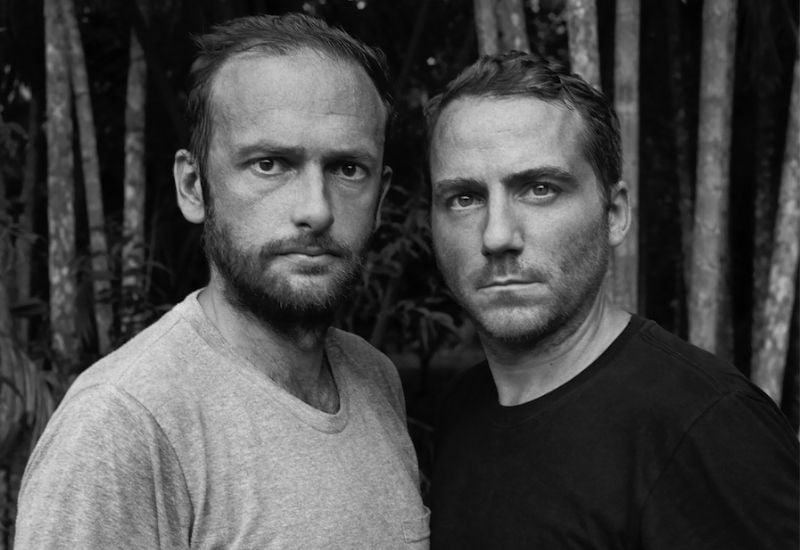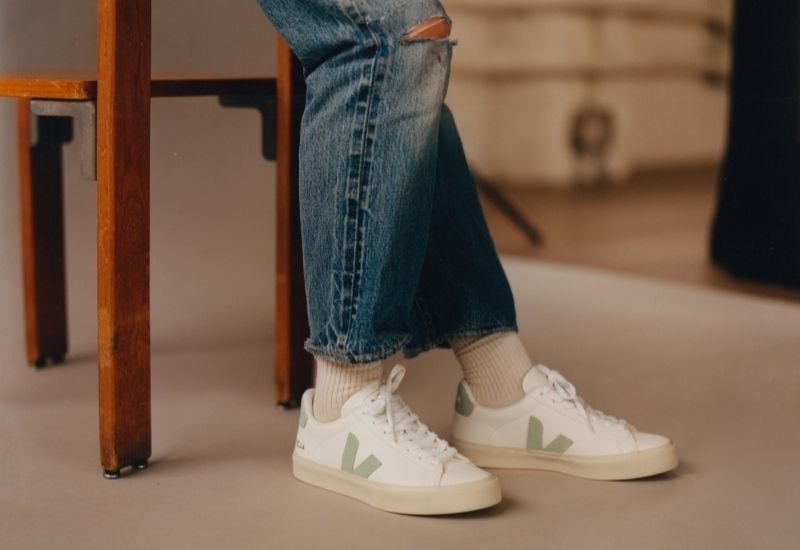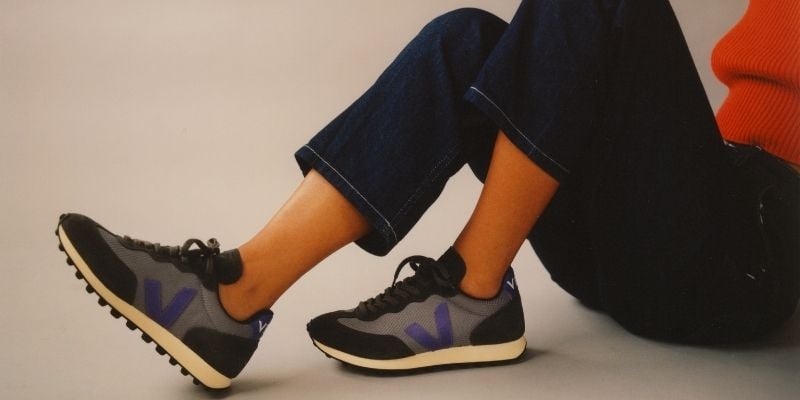March’s – ‘The Wellness Issue’ – Download Now
Founders Sébastien Kopp and François-Ghislain Morillion of eco-conscious brand VEJA, share their secret to success.
What inspired you to partner on the launch of VEJA?
SK: Ghislain and I met when we were 14 years old. We graduated with an economics degree and then eventually started working in New York and Washington DC straight after. After a few months of working in banks, we decided that this was not the life we wanted. We started an NGO and travelled around the world for a year while going on a field trip to study 70 projects. We went to China, Brazil, India, Bolivia, Vietnam, Australia and many more places to analyse projects and improve them when it came to reducing pollution, respecting the environment and enhancing the social conditions of the local population. After seeing it first hand in the field, that actions did not follow words from companies, eventually at the age of 25 decided to create a project that would be based on action, not words. Hence, VEJA was born.
The brand was established in 2005, how has the retail market / brand grown changed since then?
SK: We are not looking for fast growth, we focus on creating deep roots. Since 2005, VEJA has been growing organically, step by step, without investors. We source and control every raw material and the processes within our production chain so it takes time, but we are sure that it is the best way in order to create a positive impact. Today, VEJA has over 200 talented people, in Paris, New York, and Brazil. We’ve bought more than 390 tons of organic cotton; 450 tons of Amazonian rubber and we’ve sold more than 4.5 million pairs globally.

What is the core DNA of VEJA?
SK: The core of VEJA since its inception is to know everything about our sneakers from the agroecological and organic cotton fields in Brazil and Peru, to the mud of the Amazonian forest where we buy our rubber from seringueiros (rubber tappers living in the forest and collection latex from the rubber trees). We spend months and months in the factories where we produce our sneakers, and we have a team in Brazil that visits them every day, while we’ve also managed to build a strong relationship with our suppliers. This is why we can say that ecology is not a burden for a company, but a strength. To understand sustainability, you need to meet people, spend time with them to understand their difficulties and find solutions together.
Design is just as important as sustainability – were these both a clear focus for the brand from the outset?
SK: VEJA is walking on two feet: ecology and social justice on one side, design on the other. We never compromise between the both of them. A lot of our clients don’t know what is behind the brand, which is not a problem for us. A lot of people are discovering it every day, and we are cool with this.
Which piece to date has been your most popular shape?
SK: We love minimalism and are inspired by the worker outfit, military shoes, trail shoes etc. We design pairs that can be worn every day, and that we love first. Our models are timeless (for example, we launched the Esplar in 2010, and it still selling well). We launched the Campo style in 2019, and it is one of our best shoes.
How has partnering with e-commerce platforms such as MATCHESFASHION helped to grow the brand?
SK: We work with more than 2,500 retailers in more than 45 countries. Some are small but very cool stores in big cities, some are big e-shops. But we don’t differentiate. Since 2005 we haven’t held stock to ensure we don’t overproduce. Some client’s sell-out after a couple of weeks and ask us to restock, but we tell them they will have to wait until next season!
You have global clients – do you see trends in buying patterns as a brand?
SK: Our first customer is always us, we never set benchmarks or carry out research studies as we always create what we like to wear. We love minimalism and are inspired by the worker outfit, military shoes, trail shoes… We design pairs that can be worn every day.
Can you explain the biodegradability of the sneakers?
SK: Usually, a pair of sneakers ends up in the trash. However, sneakers are among the most complex products to recycle. After all, they are made of many different materials, often fused together. For a long time, the end of life of our sneakers has been one of our main limits, and it’s still a complex subject. For several months now, VEJA has been developing its recycling project. The purpose is to sort the different materials of a VEJA trainer such as Amazonian rubber, organic cotton or leather to establish a recycling chain. Being aware of the origin of our materials allows us to create a different end life for our sneakers. But we are only at the very beginning of the project. Today, we have recycling boxes in our Parisian store and at our Store in Bordeaux, VEJA x Darwin where people can drop off their VEJA pairs that are no longer in wearable condition.
Your use corn waste to construct the sneakers, how did you decide on this material?
SK: We have been looking for smart alternatives to leather for years. In 2014, we started a research and development program to enlarge our materials base, which made us visit dozens of innovative suppliers around the world, attend conferences and contact biologists who did many tests and try various different fabrics. Our objective was simple yet rather ambitious, it was to offer a bio-based alternative to leather, something that has a great touch and feel, with very good resistance. Our goal was to find an alternative, without using plastic, something like the majority of vegan leathers in the market but replacing leather with plastic is not a good enough solution for us. Back in 2019, we released one of our first models made from corn waste leather (C.W.L), a vegan alternative to leather. It’s an innovative material that took us four years to find and yet, unfortunately, we still could not manage to trace it entirely. Months of research and sourcing enabled us to find a better composition and source the raw material from its roots. The new C.W.L is a hundred per cent organic cotton canvas coated with P.U., corn starch and ricinus oil. The organic cotton used is the same we source for all our canvas, lining, and laces with everything made in Brazil.
What have the biggest challenges you’ve had and how did you overcome them as a brand?
SK: The main challenge for VEJA is to go beyond ourselves. We have come a long way in the last 16 years by creating the first sneaker that goes up the production chain, made with ecological materials like organic cotton or Amazonian rubber and, that we source directly. VEJA is growing all over the world without investors, organically going from strength to strength. We’ve created a fantastic team of more than 200 people. Our main goal is not a financial objective; it is to create a company that could draw a path that many others could follow if they like it and to create a company that Ghislain and I would have loved to work for.

What advice would you give anyone wanting to launch their own brand?
SK: Do what you like to do every day, even if people don’t believe in your project. Back in 2005, nobody was talking about ecology or social justice. When we launched VEJA, everybody was laughing at us, telling us we were crazy to produce sneakers that cost 5 to 7 times the price of another sneaker brand and that we were crazy to still sell them at the same price by eradicating marketing and advertising budget. But we knew our reality was in the fields, close to the producers, in the mud of the Amazonian forest, and not paying big advertising campaigns with stars. Just do what you want to see, as what matters is to act now.
This is ‘The Wellness Issue’, what does that mean to you as a brand?
SK: A slow time, to act differently, with more consciousness – I think that wellness starts here.
The collection can be purchased through matchesfashion.com and other e-commerce platforms
March’s – ‘The Wellness Issue’ – Download Now
– For more on luxury lifestyle, news, fashion and beauty follow Emirates Woman on Facebook and Instagram
Images: Supplied











